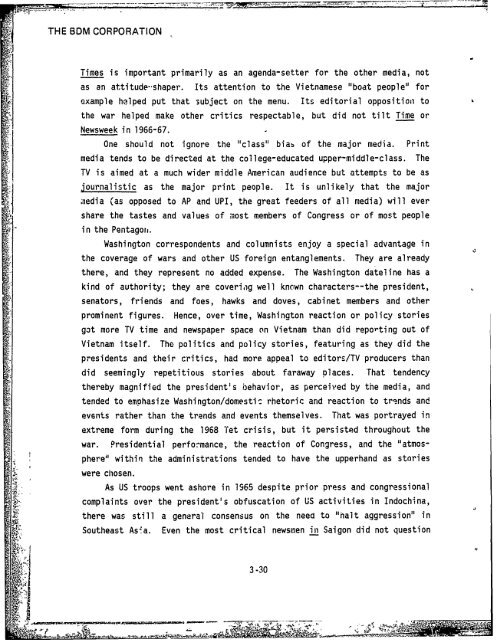policy - The Black Vault
policy - The Black Vault
policy - The Black Vault
Create successful ePaper yourself
Turn your PDF publications into a flip-book with our unique Google optimized e-Paper software.
THE BDM CORPORATION<br />
Times is important primarily as an agenda-setter for the other media, not<br />
as an attitude-shaper. Its attention to the Vietnamese "boat people" for<br />
example helped put that subject on the menu. Its editorial opposition to<br />
the war helped make<br />
other critics respectable, but did not tilt Time or<br />
Newsweek in 1966-67.<br />
One should not ignore the "class" biab of the major media. Print<br />
media tends to be directed at the college-educated upper-middle-class.<br />
TV is aimed at a much wider middle American audience but attempts to be as<br />
journalistic as the major print people. It is unlikely that the major<br />
;aedia (as opposed to AP and UPI,<br />
<strong>The</strong><br />
the great feeders of all media) will ever<br />
share the tastes and values of most members of Congress or of most people<br />
in the Pentagor,.<br />
Washington correspondents and columnists enjoy a special advantage in<br />
the coverage of wars and other US foreign entanglements.<br />
there, and they represent no added expense.<br />
<strong>The</strong>y are already<br />
<strong>The</strong> Washington dateline has a<br />
kind of authority; they are coveriag well known characters--the president,<br />
senators, friends and foes, hawks and doves, cabinet members and other<br />
prominent figures.<br />
Hence, over time, Washington reaction or <strong>policy</strong> stories<br />
got more TV time and newspaper space on Vietnam than did reporting out of<br />
Vietnam itself. <strong>The</strong> politics and <strong>policy</strong> stories, featuring as they did the<br />
presidents and their critics, had more appeal to editors/TV producers than<br />
did seemingly repetitious stories about faraway places. That tendency<br />
thereby magnified the president's behavior, as perceived by the media, and<br />
tended to emphasize Washington/domesti: rhetoric and reaction to trinds and<br />
events rather than the trends and events themselves.<br />
That was portrayed in<br />
extreme form during the 1968 Tet crisis, but it persisted throughout the<br />
war. Presidential performance, the reaction of Congress, and the "atmosphere"<br />
within the administrations tended to have the upperhand as stories<br />
were chosen.<br />
As US troops went ashore in 1965 despite prior press and congressional<br />
complaints over the president's obfuscation of US activities in Indochina,<br />
there was still a general consensus on the neea to "halt aggression" in<br />
Southeast Asia. Even the most critical newsmen in Saigon did not question<br />
V I 3-30<br />
,bow=.
















